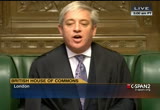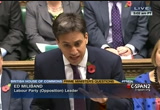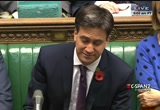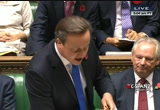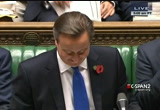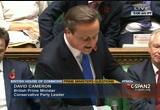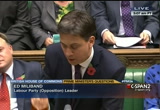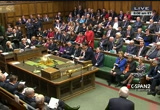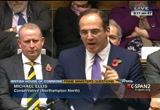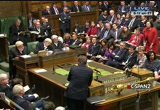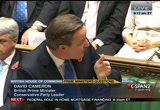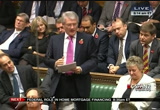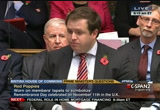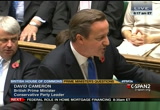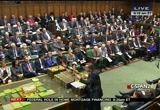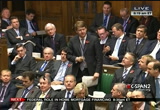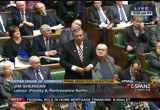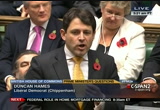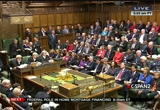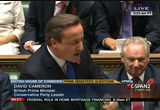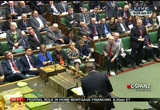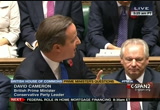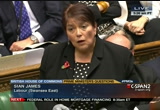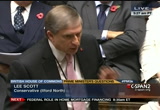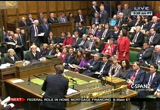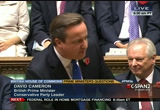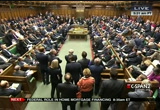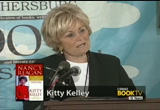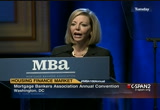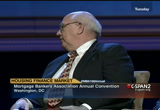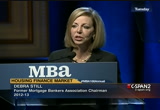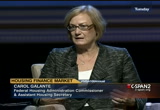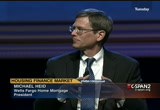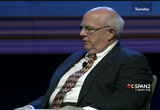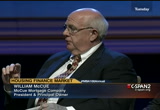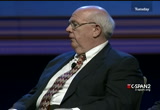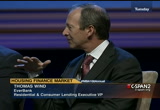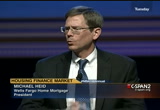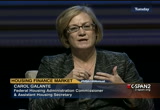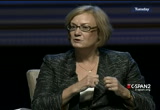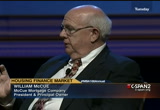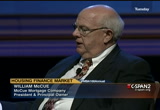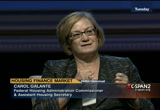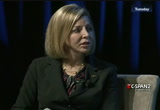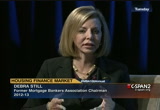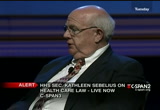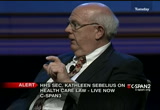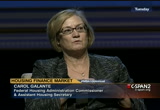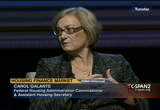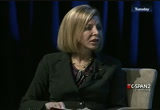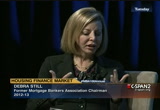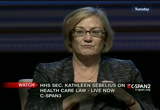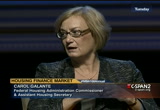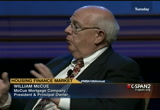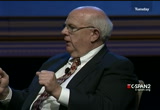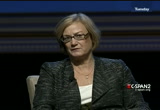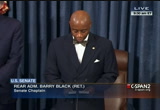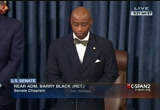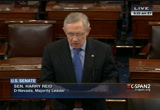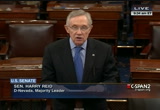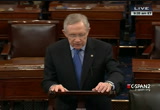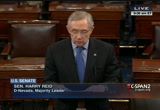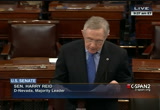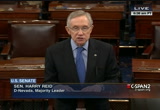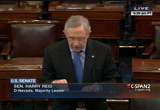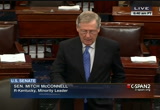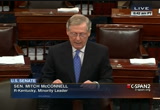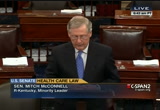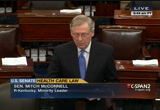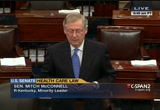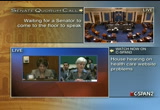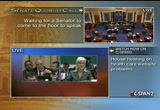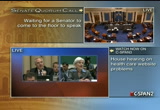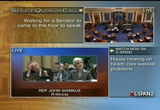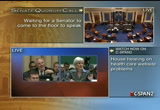tv Key Capitol Hill Hearings CSPAN October 30, 2013 8:00am-10:01am EDT
8:00 am
every wednesday while parliament is in session prime minister david cameron takes questions from members of the house of commons. wire to question time the house is wrapping up other business. this is like coverage on c-span2. >> when my friend came into office in 2010 what has been done to tackle air and that? .. -- to tackle air and financial data? ..
8:01 am
. has programs which clearly leads to the disappearance of a million jobs. isn't it time for the -- admit they're wrong and to apologize? >> my honorable friend is absolutely right. the british economy is on the mend. we see unemployment coming down. the numbers didn't work going up. our growth rate now forecast to be almost three times as fast as german growth and frankly the party opposite and leader of the opposition told us we would lose a million jobs. he was absolutely wrong and it is time he got to his feet and
8:02 am
told us he was wrong. >> mr. speaker? having listened to select committee hearing yesterday, can the prime minister tell us what's the difference, can the prime minister tell us what's the difference between his -- >> order. can i just say to the prime minister's pps, his role is to nod his head in the appropriate places and to vet and carry notes. no noise required. >> mr. speaker, listen to the select committee hearing yesterday. can the prime minister tell us what is the difference between his policy on energy and that of the energy companies? >> not a word of apology about a predicting a million jobs lost. they bottom it wrong and they can't bear to admit it.
8:03 am
>> order. >> the question must be heard and the answers must be heard, however long it takes, some people need to get used to fact that is what the public would like to see from the house of commons. the prime minister. >> in the energy market, is more competition, and lower levyies and prices to drive profits and prices down. what we learn in the last week, mr. speaker, this competition should be switching at dispatch box. he said, i will tell the prime minister, telling people that the answer is to switch our suppliers. but what did we find out over the last few days? he switched his supplier! yes. i went, he went for one of these insurgent companies to cut his bill. isn't it typical. he comes here every week and attacks tory policy. he goes home and adopts tory policy to help his own family.
8:04 am
! >> mr. speaker. the only thing people need to do, if they want somebody to stand up against the energy companies, they switch the prime minister and that is what they know. now, now, as the unofficial, as the as the unofficial spokesman for the energy companies, maybe he can answer the question that they couldn't answer yesterday. can he explain, can he explain, why when wholesale prices have hardly moved since a year ago, retail prices are rising by around 10%? >> because we need both competition and rolling back the cost of charges. looking, switching, switch something part of competition and the company that he switched to had this to say about his energy --, listen to the people providing his energy.
8:05 am
they said this. a policy like this is potentially problematic for an independent provider. bluntly, bluntly, it could put me under. so that is his policy, not listening to the people providing his energy, but having less choice, less competition higher prices. it is the same old labour. >> he hasn't answered question. i will explain something quite simple to him. you see most energy companies don't want a price freeze, right? most consumers do. that is why the energy companies, forget the price freeze, he is so on the side of the energy companies, mr. speaker. call them the big seven. the prime minister and the big six energy companies. now, in opposition, in opposition he said this, he said there was a problem in the relationship between wholesale and retail prices. and he went on to say, the first
8:06 am
thing you've got to do is give the regulator the key to order that those reductions are made. and that is what we would do. mr. speaker, why would it come to the energy companies, has he gone from rambo to bambi in four short years? who was it who gave us the big six? yes, when labour, when labour first looked at this there were almost 20 companies. but because of his stewardship we ended up with six players. now they talk about a price freeze, but down the corridor they have been voting for a price rise. that is right. they voted for a dhi qar bonnization target that rise prices -- dhi qar bonnization.
8:07 am
>> so hard to keep up with this prime minister on green levies, isn't it. believe it or not he was boasting about the size of his green levies. he said this, i kid you not, he said, and i quote, ecowas many times the size of the scheme it replaced. so when it comes to green, as, as short time ago as january he was saying the bigger the better. now he says the opposite. here's the problem, here's the problem. on competition, here's the problem. ear's the problem. here's the problem. he wants to review, he wants to review an energy policy but that is exactly what the energy companies want, a long inquiry, kicking the problem into the long grass. how will they review the report next summer help people to pay their bills this winter? we want a competition inquiry that starts straight away. that is our policy. but the point about, the point
8:08 am
about vote fog a price rise he has to answer because this is what the former labour energy spokesman, lord donahue said in the house of lords and he should listen to this he was their energy spokesman. he said this, i have never spoken against the labour amendment in 28 years in this house but i am troubled by the consequences for ordinary people. the amendment will raise the cost of living and is in conflict with a future price freeze! that is it, from labour's own policy spokesman in the house of lords. the fact is the whole country could see he is a one-trick pony and he run out of road. >> if he wants to talk about what people are saying, if he wants to talk about what people are saying -- >> order. members try to recover some semblance of calm, it would be
8:09 am
good for the health, beneficial to their well-being of the they must try to grow up even after the age of 16. ed millie brand. >> his own man he put on climate committee says his figures are false. that is what he said. he has opportunity to do something for the public next week. he has an energy bill going through parliament. instead of hit sitting on his hands he could amend that bill to institute a price freeze now. we'll support a price freeze. why doesn't he act? >> because it is not a price freeze. is a price con. the fact is, he is hiding behind this economically illiterate policy because he can't talk about the economy because, it's growing. he can't talk bun employment because it is falling. he can't talk about the deficit because it has come down. he has got nothing else to say.
8:10 am
he is just a weak leadwer no ideas >> i tell you who is weak, this prime minister who is too weak to stand up energy companies. this is the only way we can do with the energy companies overcharging. time to act like a prime minister, standing up for consumers and stop acting like a pr man for the energy companies. >> i'll tell you what is weak, too weak to stand up and admit their economic failures. too weak to stand up to mcclose ski, hoe tried to wreck the petrochemical industry and too week to stand up to the shadow chancellor. >> order. mr. quinn, recover your composure, man! you're wholly out of control. the prime minister. >> let just examine what has
8:11 am
happened with hs-2 this week. the shadow chancellor, touring the radio studios, telling everyone it won't go ahead. labour local authority leaders begging the leader of the opposition to stand for this infrastructure scheme and what has he done? cowered into his office, too weak to make a decision, to put it another way, britain deserves better than that lot. >> thank you, mr. speaker. thank you, mr. speaker. last year, businesses, yes, businesses created three times, three times as many jobs in the private sector as were lost in the public sector. so is it not high time, prime minister, that those who made mystic predictions we would not be able to create as many private jobs as we did in the public sector, go on to admit they got it wrong?
8:12 am
>> my honorable friend is absolutely right, they should admit they got it wrong. let us remember what the leader of the opposition said as late as march 2012. he said this, you're not going to be able to replace the jobs in the public sector quickly enough with jobs in the private sector. the fact is, we've now got one million more people employed in our country, 1.4 million private sector jobs but they're too weak to admit they got it wrong. >> i'm grateful, mr. speaker. does the prime minister believe that the a&e crisis in the hs has anything to do with the fact that he has cut 6,000 nurses since coming to power? >> what we see in the nhs is 23,000 fewer, non-clinical grades, actually bureaucrats and managers taken out of the nhs and we see 4,000 more clinical staff including over 5,000 more doctors in our nhs.
8:13 am
that is the change we've seen. but just imagine if we listened to labour and cut the nhs budget, we believe in the nhs we have invested in it. >> thank you, mr. speaker. as the chamber of commerce reports the economic survey real business optimism with a rise in the number of local firms employ more starve and increase in u.k. orders and 10% increase in sales. does my right honorable friend agree with me that is the evidence that the government economic plan is working and party opposite got it wrong? >> my right honorable friend is right, we had to make tough decisions. growth is there. unemployment is falling. the number of people in work is rising. we have 400,000 more businesses in this country, and if we had listened to the shadow chancellor who said we were in for a lost decade of growth we would have higher debt, higher interest rates. it would be the same old outcome under the same old labour. >> thank you, mr. speaker.
8:14 am
in a recent survey from youth switch, 75% of people said they switched their heating off one or more occasions last winter. does the prime minister expect this number to go up or down this winter due to his inability to stand up to the energy companies? >> fuel policy went up under labour, and under this government we maintained winter fuel payments. increased cold weather payments and increased benefits the poorest families get in our country. that is the action we've taken. we can only afford to do that because we have taken tough and sensible decisions on the economy. >> andrew jones. >> a few days ago i launched the business case for the electrification of the rail line which will have more trains, faster services, better rolling stock. after the loss government electrified nine miles in 13 years, can my right honorable friend continue to prioritize
8:15 am
electrification. >> he make as very good point, the last government did nine miles of electrification in 13 years. absolutely pathetic record. we're puting a billion pounds into modernizing railways in the north of england. look at this issue of hs-2. we all know it needs cross party agreement to make this important infrastructure team go ahead. what a pathetic spectacle we've seen this week. one minute they're for it, then they're against it and leader of the opposition too weak to make a decision. >> i come across a very interesting interview given by the prime minister to the "times." constituency office, in his words he needed to turn the heating on just so it's a bit nicer when i get back this afternoon. how many of my constituents does he think will be able to afford such niceties as we approach this winter? >> what his constituents will understand, their price freeze is a price con. prices would go he have beforehand. prices would go up afterwards
8:16 am
and as he himself has admitted they wouldn't be able to keep the promise because they don't control gas prices. that's why everyone knows it is a con. >> thank you, mr. speaker. my 20-year-old con sit went left school at 16. was told only choice he had which prison he might end up w. four years later he is owning one of. wales best chocolate brands. does prime minister approve with me, record number of new business startups are economic sign people like neil burgess due the excellent work of the chancellor? >> i certainly join my honorable friend paying constituent turning his life around and contributing to the economy. we see 400,000 more businesses. they're up and running in our country. of course labour don't want to hear about success stories. they don't care. they don't care about enterprise. they don't care about small
8:17 am
businesses but this enterprise and this small business that is turning our country around. >> mr. speaker, there's a new flat just launched in my constituency, and it has been built partly as a result of public money under the government's affordable housing scheme known as shared to buy. two bedroom flat in pietri court. it is 720,000 pounds. does the prime minister believe this to be affordable, and -- >> we need to build more houses in our country and that is why we're reforming the planning system which they opposed. that is why we've introduced help to buy, which they opposed. which is why we put extra money into affordable housing which they opposed. they are now will build absolutely nothing anywhere party, as a result housing will become less affordable. >> paul apple. >> over the last few decades,
8:18 am
hundreds of millions of people have been lifted out of poverty in india and china globally. as those people have increased their living standard their energy demands have increased as well. will my right honorable friend agree if we have sustainable long-term energy the deal which the chancellor held in few weeks is chinese initiative is crucial, much rather than short-term political gimmicks? >> i do think it is very important step forward to encourage inward investment into our country to help fund our nuclear program. i think that actually means we're going to have dependable supplies of low carbon electricity long into the future. and to the people who opposed foreign investment, the party opposite opposed foreign investment, with all the flip-flops they have done this week i wouldn't be as all surprised if they didn't start opposing nuclear energy too. getting this foreign investment in means we can use our fire power to build hospitals, to build schools, build roads,
8:19 am
railways and modernize our countries. >> does the prime minister believe that royal mail was undervalued? >> i think when you consider that royal mail in the past was losing billions of pounds, the whole country is far better off with royal mail in the private sector. i just talked about, flip-flops. here's another one from the labour party. who was it who said we needed to privatize royal mail in the first place? anyone? anyone? where is peter mendelsohn when you need him. he said they needed private capital. i agree. they said we need private management. i agree. it has taken this government to deliver the policy. >> thank you, mr. speaker. 1 1/2 million jobs created byes and 400,000 new businesses, last month's figures show the biggest monthly fall in unemployment on record. unemployment is now down over 30% since its peak under labour. would the prime minister agree why attacking business but
8:20 am
spoehring businesses to grow we can undo labour's legacy of unemployment? >> my right honorable friend is absolutely right. whoever was in government now would have to make difficult reductions in the public sector obviously that leads to reduction of public sector jobs. we need a private sector recovery. that's what we've seen. 1.4 million jobs in the private sector. overall more than one million people employed in our country. that is one million reasons to stick to our plan and reject the medicine suggested by the party opposite. >> mr. sheridan. >> prime minister, couldn't legislation to protect agency workers stop exploitation of migrant workers to protect wages and of our indigenous workers? i know this issue can he reassure the house he win taper resist any temptation to dilute even further protection for agency workers?
8:21 am
>> what i want to see is more jobs in this country and that means making sure we keep a flexible workforce. of course what the honorable gentleman didn't tell us he chairs the unite group of labour and peace. so, perhaps he ought to declare a when he stands up. and while he is at it, perhaps he could have a word with mr. mcclosky we need proper inquiry what happened into unite. proper inquiry what happened in grains, we know the leader of the labour party is too weak himself. >> mr. speaker, the economy grown 1 1/2% in the last six months, during which time the typical constituency the numb per of job squeakers fall ledge by 1/5. requires a workforce which is highly skilled but hopes were dashed five years ago when the national college building program ran out of money. will the prime minister join me
8:22 am
in backing wilshire colleges bid for skilled funding agency to rebuild the chippeham to give local students the skills employers demand. >> i very much agree with what my right honorable friend said. we all remember the huge disappointment when labour's planned investment collapsed in some of our colleges. i saw exactly the same thing in whitney college and this government is now putting money to see that expansion and improvement and better quality colleges into place. i'm sure that could happen in wilshire as well as whitney. >> peter ames. >> 2/3 of the green levies of groaning bills were established under this government. why is the prime minister attacking himself? >> he's wrong the fact is, many of of the green levies were put in place by the party opposite. but let me remind him, remind him one of the first acts of this government was to take 179-pound renewable heat
8:23 am
initiative which the leader of labour party wanted to put on every single person's bill in the country. we took that and we took it off the bill. >> everett wheeler. >> will the prime minister join with me in congrat hailing workforce at toyota in my constituency as well as manufacturers across the count think whose hard work ensured the car production went up by 10% in the last year? >> well i certainly join my honorable friend. i remember my own visit to there they don't want to hear good news about manufacturing. they don't want to hear good news about our car industry. the fact this country is net exporter of cars again. we should be congratulating the workforce at toyota. we should be congratulating workforce at jaguar, land rover. we should praise what they're doing at nissan. they are leading reindustrialization of our
8:24 am
country. i was at the county works on monday, the mini doing brilliantly, leading to more jobs, more apprenticeships, more skills, all things we welcome under this government. >> thank you, mr. speaker. for launching our reports on electrical conduct yesterday which found shocking examples of racism and discrimination during election campaigns. i would like to ask the prime minister, mr. speaker, whether he will back our call to get political parties the electoral commission and equality and human rights commission to work more proactively now in areas of tension so that the next general election can be a battle of ideas and not raise hate and discrimination? >> i very much welcome what the honorable lady says. and i welcome the report of your parliamentary inquiry into electoral conduct. i will study the report and if there is anything we do cross
8:25 am
party cooperation we take racism out of politics we will certainly do so. >> thank you, mr. speaker. thanks to the government's regional growth, 8 million is reopening the rail, cutting travel times between birmley and manchester in half. better rail connections to the south of england are also vital. does the prime minister not agree with me it is absolutely outrageous for the party opposite to challenge hs-2 at current time putting in jeopardy and jobs an investment in the north of england? >> i think my right honorable friend is absolutely right to stand up for his constituents, stand up for the north of england because there is a real danger with labour's antics they are letting down north of england. letting down the middle. let me remind the shadow chancellor what he said about transport investments. said nowhere is consensus more essential than on our national infrastructure. he said this, success tiff governments docked or delayed vital decisions on our national
8:26 am
infrastructure allowing short-term politics to get in the way. that is his own words he is found guilty of short-termism and petty politicking rather than looking after the national interests. >> john james. >> the prime minister --, is the prime minister, along with the justice minister about the probation service especially in light of the trials actually being called to a halt. is he prepared to gamble especially with the lives and daily safety of might have constituents and other people in this country and will his gambit hold up? >> what we want with the probation service is a service that is much more focused on getting results, on stopping reoffending and also making sure that we give people services in terms of rehabilitation, from
8:27 am
the moment that they leave prison. that doesn't happen today. but it is interesting, mr. speaker, 26 minutes past 12:00, not one question from labour on the economy. they got nothing to say. they got nothing to offer. they are embarrassed. the prediction after prediction was completely wrong. >> right honorable friend, i agree. >> order. >> question from the honorable member must and it will be heard. >> thank you, mr. speaker. my right honorable friend, i welcome the full folding unemployment down to 3.7% in my own constituency, but, will he recognize with me that's one of the biggest problems is young people with special needs, particularly autism, aspergers getting to work and congratulates the lond door borough of red bridge and interfaith parents group project started with first young people
8:28 am
of special needs in work? >> well, i know my honorable friend's close attention to this issue and deep care about this issue. i certainly pay tribute to red bridge and all those who help children with special needs. through our former special needs we try to focus help on those who need it most to make sure they get the help they need. >> thank you very much, mr. speaker. i have a question on the economy for the prime minister. does the prime minister agree with his on advisors, that t they are not failing to attack the al appalling high levels of youth plent. >> we're seeing the youth consider the, people getting work through our work scheme. it is more successful than the futures jobs fund but six times as little through the youth
8:29 am
contract. we've also seen over 20,000 young people get work opportunities. that ask why we see the youth unemployment coming down in our country. there is far more to do to get young people into work. the fact we backed over 1 1/2 million apprenticeships is sign showing how much we care about getting young people back to work. >> thank you, mr. speaker. does the prime minister agree with president obama that there needs to be additional constraints how we gather new intelligence? we need to more effectively weigh the risk and rewards of our activities? will the prime minister follow the president's lead? >> what i said in the house before and i repeat again, obviously we listen to what other countries have to say about these issues but i believe in britain we have a good way of having intelligence and security services, having them overseen by parliamentary committee, having their work examined by intelligence commissioners and insure they act under proper legal basis. i take those responsibilities very, very seriously but i
8:30 am
believe we have a good system in this country and we can be proud of people that work in it and proud of the people that oversee it. >> david anderson. >> mr. speaker, we mentioned the energy companies have been outsourced to china, french, lights may go out, pensions will freeze this year and we have -- big six. does the prime minister have any regrets -- by former tory movement and defamation of the -- in the world? >> what i would say, to the honorable gentleman in terms of energy security that he back ad government that in 13 years never built a single nuclear power station. oh they talked about it, boy, did they talk about, but they never actually got it done. in terms of chinese and french investment, i think we should welcome foreign investment into our country, building these important utilities so we can use our fire power for the
8:31 am
schools and the hospitals and roads and railways we need. >> andrew percy. >> there are, in my constituency, sure to be over 100 wind turbines and 30 or 40 in the planning system. these turbines are paid for by my constituents but not restricteded to concreting jobsn my constituency. can he assure changeses to green subsidies, that the jobs in that sector of energy are actually here in the united kingdom? >> well, i know how hard my honorable friend has worked with other mps on a cross-party basis across the region to try to attract investment into our country and we should continue to target that investment. >> will the prime minister join me paying tribute to the positive role played by trade unions in the work of the automotive council which has brought the renaissance in the
8:32 am
u.k. car industry? >> i think the automotive council has been extremely successful. where trade unions play a positive role i will be the first to praise them but where, where, frankly, where frankly we have a real problem with a rogue trade union that who nearly brought the petrochemical industry to its knees we need to have a proper inquiry, a labour inquiry of if they had any courage, any vision, any strength of decision-making they recognize they need to have the inquiry to get to the bottom of what happened. >> order. statement, the secretary of state of health. >> from london, you've been watching prime minister's question time, aired live every wednesday while parliament is in session at 7:00 a.m. eastern here on c-span2. you can see it again sunday night at 9:00 p.m. eastern and pacific on c-span. for more information go to
8:33 am
c-span.org. on the homepage click on international for british parliament and other legislatures around the world. also links to international media, and c-span programs on world issues. >> i'm a firm believer what they call unauthorized biography. unauthorized does not mean untrue. it means you're doing it without the cooperation and blessing of your subject and i do believe it's a legitimate, wonderful way to cover history. especially public figures that have spent many, many years and millions of dollars creating their own image and so i think it's valuable sometimes to go behind that. so usually i'm the one who's
8:34 am
trying to get behind that and tell you what's going on. >> presidential history, political intrigue and american culture. biographer kitty kelley sits down for your comments life for three hours, sunday on booktv's in depth. in the months ahead look for other in depth guests including feminist critic christina hoff summers. and radio talk show host mark levin on january 5th. you have a few more days to post comments on this book club selection, walking with the wind. congressman john lewis own the early years of the civil rights movement at booktv.org/book club. >> what is the most important issue congress should consider in 2014? that is the question for middle and high school students for c-span video competition. make up a five to seven minute documentary that includes various point of view and includes c-span video for the
8:35 am
chance to win the grand prize of $5,000. we doubled this year number of prices. entries must be in by january 20th, 2014. >> at the annual convention of the mortgage bankers association a panel does discussed the role of the federal government in the housing finance market, participants include wells fargo home mortgage president, michael heid, the head of the federal housing administration. this is just under an hour. [applause] ♪ >> well thanks, to nate and many things to igate for sponsoring our session today, and welcome, everyone. thanks for staying with us. and hearing our discussion on restructuring the government's role in housing. i'm pleased to introduce our
8:36 am
panelists. carol galante was confirmed as secretary for housing and commissioner of the fha at the u.s. department of housing an urban development in december of 2012. carol came to hud in march 2009 as deputy assistant secretary for multifamily housing programs from bridge housing corporation, the largest, non-profit developer of mixed income and mixed use developments in california where she was president and ceo. her decades of work in affordable housing an development and managing fha's multifamily programs give her a unique perspective on the issues facing the mortgage markets. mike heid is president of wells fargo home mortgage and executive vice president and operating committee member of the wells fargo and company. mike is responsible for wells's overall business and strat--
8:37 am
strategic direction. having joined wells fargo in 1988 mike held a number of senior executives positions before moving to his current role as the president in 2011. mike is a 27-year veteran of the mortgage business and is actively involved in legislation and regulatory policy affecting the mortgage industry. at present he is a member of the mba board of directors and has previously served as chairman of the housing policy council and chairman of fannie mae's national housing advisory council. >> our next panelist is william j. mchue. the president and principal owner of the mchue mortgage company a mortgage banking firm that originates and services residential mortgage loans in the state of connect cult the company was founded in 1949 by his father, william mchue. bill has been president since 1977. the mchue mortgage company
8:38 am
originates about 500 million in production per year and has a servicing portfolio of approximately one billion. the company's focus is and always has been on lending to first-time buyers. serving this market segment requires the company to participate in many government and government-related programs. bill serves on mba's board of directors and mba's residential board of governors. tom wynn is the executive vice president of home lending are ever bank. tom joined everbank in the spring of 2011 and brought with him extensive knowledge gained in 25 years of financial and mortgage-related experience. before joining everbank tom led the restructuring of lehman brothers mortgage lending platform and prior to that he was ceo of the mortgage lending business of jpmorgan chase and also served as ceo, or president and ceo of citi mortgage.
8:39 am
at everybank tom is responsible for the growth and fulfillment of residential and consumer lending. let's give our panelists a round of applause for being here with us today. [applause] so, the debate has begun and you heard the comments this morning, the future of the government's role in housing is at the forefront of discussions in washington, d.c. and throughout the lending community. five years after being placed in conservatorship fannie mae and freddie mac continue to be the central role for the u.s. mortgage market. fha continues to be the primary source of affordable loans for first-time and low to middle income families. as the dialogue gains momentum there seems to be broad alignment in washington that now is the time to begin restructuring the federal government's role in real estate finance. our experts are here to discuss their views and their
8:40 am
perspectives on the government's role in housing, the important aspects of reform. and the approach necessary to transition the marketplace from here to there. so with that context, i think i will start with a question on timing. hello, everybody. you know, it's clearly the dialogue in washington is picking up momentum and we heard comments this morning from secretary donovan and acting director demarco on the same. yet you still hear from members of the lending community, why don't we just leave fannie and freddie alone? so let's talk about is reform needed? is the time right? is now the right time and what's wrong with the status quote? and carol, maybe you would like to start, commissioner galante. >> sure, thank you for the question. i think it's really important that we start on this journey
8:41 am
now. reform is absolutely essential. and i say that because, and i'm sure, secretary donovan mentioned this morning. we can not continue with the system where we had privatized gains and socialized losses. and, that has to change. i think the challenge for the industry is, we need to figure out what that end state is and, then we need to plan for it. so there is both the transition to get to it, but, you know, we've got to get started and, part of the reason i think that the time is now for that is, there are actually is some very good progress in congress, bipartisan interests, finally coming to together to tackle this tough issue and, i think that we can get momentum on that. >> thank you. mike, what about a business perspective? >> oh, agree with carol in many
8:42 am
respects. the important part is to think of it in two stages. there is the plan and there is, you know, the process of transitioning to that plan, two very different things the plan, you know, a piece of unfinished business from the crisis that's still in front of congress. as far as transitioning to, whatever that new end state is, that can be over a long period of time. i think if you break it into those piece, you can see where the people, the process, the systems of the current gs etches need to be preserve, to move forward to allow the housing market to transition to a different end state. not having a disruption of housing, not having a disruption of credit to american families, that type of thing. but clearly the, you know, a plan. if you had a plan, it would think the transition to something might be a little easier than piecemealing approach towards reform we're currently having to operate under. >> thank you. bill, what do you think? >> deb, let me start by
8:43 am
reminding myself i would be remiss if i didn't thank you first of all on behalf of all independent mortgage bankers for the year of leadership that you provided. you've shown us that challenges can be embraced. that energy can be provided. , from an individual that can create a leadership example for all of us. so thank you, so much for that. and, i know you will continue to make it important contribution, and your success, after success will continue. >> thank you. >> to the subject at hand, i guess you start with status quote. we really don't have a status quote. what we have is a series of annual events that go back to 2007. they have create ad crisis which we reacted. our status quote is a reactive
8:44 am
defensive mode. we don't have a housing policy. we, so we don't need to reform it. we need a housing policy. and that is not meant to be a criticism. i've been around a long time and i watch ad lot of administrations. and this is the first administration tahas ever had to face the possibility of coming up with a housing policy under themost stressed conditions from the moment this president walked in the door. so the response has been, defensive. it has been reactive, to crisis that was once in a lifetime. so we need to have a housing policy. status quote is only a reaction. is it the right time? no, the right time was three years ago but it is now, is the best time to start if we haven't. so housing policy and enactment and addressing all the issues is critical. now if we don't do it now, it will be even more critical next year. >> thank you, tom, what do you think? >> yeah. sort of not a whole lot to add
8:45 am
what has been said already but i think going back to simply some of the earlier comments today. two of the three primary legs of industry are in conservatorship. that is a status quote i don't think which can maintain. we to look forward. we need to look what we're going around the industry ability to pay qm. any systemic change like that will take a long time to play out. i think we need to do it carefully and snead to plan for it. we need to be transitional with it. no big bang to be had here. i think a big badge is. i think we need to add private capital wings if we can create the right framework for it. . .
8:46 am
>> i have to that the we've gone through a period of refinancing. that has always cratered an opportunity to make a lot of money, to do a lot of transactions and make a lot of money. that has comforted us in this time of great stress. so it seems to be behind us, and so now it's the new policy, it's many vehicles that are going to create a dynamic of housing ownership, the acquisition of ownership that needs to be put in place. >> thank you. so mike, let's go back to one of your comments. you said that there are pieces of the infrastructure that need to be preserved.
8:47 am
maybe you could expand on that a little bit? >> i think everybody here has grown very accustomed to the way the world operates, securitization markets i think is by far the best way for housing finance in america to operate government to preserve the securitization system means that somebody needs to be in a position of taking the credit risk. as we've seen private capital taking credit risk in front of the taxpayer, i think it's about a model to move towards. in today's world in conservatorship just by definition of risk, talk about holding pattern, the taxpayer is basically on the hook for every type of credit risk that is being taken in the market. that is not a sustainable way to operate for the long haul. >> bill, do you have anything to add to that? what do you believe needs to be preserved? >> the most dramatic impact temperament impact and daily impact that the creation of the
8:48 am
secondary market, and it move into a leadership role in our country has been uniformity. we have gone -- when i started in this business and commercial banking 40 years ago, there were 187 banks in connecticut. that meant there were 187 notes, 187 deeds, 187 appraisals. gone to uniformity. that has grippe good a level ofy that did not exist prior to that. you didn't have as many crisis for that matter but it created a quality and, of course, that uniformity has created a flexibility with those, that addresses that whole concept of securitization and accommodates it. that's been for the most -- the most important thing to me that's occurred at someone in the field originating, but it also has helped us draw together as a nation i think of lenders.
8:49 am
and that has got to be preserved. we can't go backwards on that. we've got to preserve that. and then, of course, the organizational structures, the methods of doing things as well. >> maybe to add to that. a plug for the mba. in the mix of all the agenda in your packet there's a two-page document that maps out the case for gse reform. and more importantly from a practical lesson, talks about the elements that have to be there for the future, talk about some of the transitional steps that could be the right now and that the most important it designs a mechanism that works for all lenders, large and small. think about what lenders do and what we all do is serve customers up front. what we rely upon in the current system is a different entity, a different group of people, a different management team that takes the loans we originate, moves them into the secondary market and takes the credit risk
8:50 am
and all of the profit that goes with it. think about what lenders do, what we do, the gses are the conduit to achieve the movement into there's a tradition market preserving the basic structure, preserving the basic mechanism of how to operate, and can easily be done. >> so mba has described a couple things we could do in the short run. would you like to touch on a couple? tom or mike. >> sure but i think the point around up front risk-taking is an important one. is a model we already have in the market that my company is taking risks on the highest ltv loans to begin with. moving that further to the next step, so the risk-sharing that we have in place today or that's been discussed on the backend, moving it up to the front and i think will allow the lenders to come into the picture for a more
8:51 am
competitive and on and leverage a platform that's really already there. >> i remember we were in the meeting and you centered on the up front risk-sharing as a good step today. any of the steps you would put first? >> i think very short term, the issue of very tactically we have the issue of fannie mae and freddie mac security price differentials and what that means for the marketplace. i think the moves itself into many of the solutions that are being talked about in congress, move towards probably a more simple business model where you have a single security and separate from a single city concept you have the securitization platform as a basically technological means. the work towards solving the here and no problem of differential security pricing and what that means, moving towards this notion of a single security that all issuers basically we deliver into. >> do you think we could move to a single security without disrupting the market too much
8:52 am
before, call it, the full reform? >> i think we have to. it's not easy and needs to be a thoughtful design and it needs to certainly be thought through over a time horizon that accomplishes the lack of destruction. i think that's all very possible, very doable. there's a variety of ideas that have surfaced with some thought leadership to facing nation in shaping the such the market can move in that direction. the biggest increase -- ingredient, missing ingredient right now is the leadership bush to ask her shape the solution that needs to occur. in absence of that what's happening is you can see freddie mac security issues continue to diminish. fannie mae continues to be the predominant piece. so was not getting done inside of the fha va ginnie mae space is larger already moving in the direction of single security source through natural market forces.
8:53 am
>> interesting. >> the one thing i wanted to add that certainly i think can and should be done in the short term of transition is some work that we are doing and director demarco mentioned this as well, you know, creating an environment today for lenders to be able to feel more confident about the rules of the road within the put back risk, whether it's fha or the gses. so we are very engaged in that process as you know with a group of mba lenders trying to work together to define materiality and really put forth a process moving forward. we are starting with announcing tomorrow a consolidation of a thousand mortgagee letters, into one single authoritative document. we are putting it out as a draft
8:54 am
to get feedback. feedback. we're starting a new process that's just a chunk of it by the way, the origination process. but those kind of steps can be taken today to grate a little more certainty in these uncertain times. >> a good point. >> exciting is. >> we are all excited about big documents. so commissioner, how do you think about defining fha's role in housing finance as we think about these new secondary marketing entities that today we call annie and freddie? >> sure. i think first of all -- fannie and freddie. there will always be a role for fha for both tradition underserved borrowers and that includes some first-time homebuyers, and as well as to play the kind of countercyclical role that we did during this crisis. it's exactly unclear how much
8:55 am
future entities since we don't know exactly what they will look like yet what kind of triggered there will be for their involvement in a countercyclical role as well but if you think it is a role for fha, and that's going forward. so showed our general appetite in normal times be less than it has been during this crisis? absolutely. there are lovers to i think create that situation terms of the loan limits -- there are levers -- for the market in general going forward. but i think went to look at how long-term fha nests into was is over all would be better think there is an ongoing role. >> so the chicken or the egg, the define what these new entities do and then fha picks up what might not be covered? or do you start by defining fha's mission and then build around that? >> that's a really good
8:56 am
question. i would actually say it is divided this way, which is a little bit different than the way you suggested what the chicken and it might be. there are some things that congress could do today that fha needs no matter what. some of these things we been asking for or a number of years including clarifying indemnification authority for all lenders, being able to terminate on a national basis and not just geographics. the simple things that i think there is full bipartisan agreement on. we think those need to happen, need to happen urgently. no matter what's going on with the rest of housing finance system around us. when you didn't talk about issues such as what fha loan limits should be, i don't think fha goes first and you look at what the rest of the system looks like. i think they need to go together. >> any other thoughts on that?
8:57 am
>> the idea of fha having to position itself with come into a newly developed secondary market to me would be a real disappointment and a disservice to the american people. the administration, as with any administration, needs to define what fha is going to do, and to whom it is going to provide service. we know we need that. we need that as part of the bolstering of our middle-class, which has been under as much of an attack in recent years as we in the mortgage business have. so that i think we need to define the fha policy and to make sure that policy is focused on serving those that need. and end of the commission agrees with this completely. to my sense, there's nothing that comes before the. we identify that are in the time i've from the business, my father started, 97% of the loans
8:58 am
have been fha insured. every one of those has been an opportunity for someone to step in to homeownership that most probably would not have been able to had that not been there. and not one of them that is paid off the loan and bought another house has gotten an fha loan. fha is a catalyst that must be preserved. it must be preserved notwithstanding all that must happen, and just to let back a little on where to go in the secondary market. it seems that the critical point is we focus our attention on not that any game which we seem to want to get to, -- and again. we want to define clearly that permanent entity that will be at the end of our trial and tribulation. we need to make this ground a fertile ground of testing and trying things define what's best.
8:59 am
and maybe find that there are multiple things that are best. and then be prepared to execute those. but not to limit ourselves by that idea of the in game as opposed to the transition. >> very interesting. mike? >> a couple things just to echo. one real risk of the current discussion is this notion of the real form -- it can be excused cannot do much of anything in the short term because we wait for that to occur. for all the reasons mentioned, fha programs need certain changes here and now to move forward. there's a variety of transition steps, including a lot of what bill said. that needs attention. not only inside the fha program but just as prevalent, impediments to credit in the gses base. so it's to make sure that you
9:00 am
can break the problem part, move forward on gse reform as a discussion in terms of its own activities that does require congress, but other elements, some of which the narrow version of fha activity is our congressional action but then a lot of the transition steps in the short term solutions that can move no matter what, keeping in mind that this kind of multiple prongs of attack. i think it's going to be important, but also i think people getting vacancies in the discussion around the macro things. >> tom, any comments or shall we move on to the next section? let's talk about private capital. the government is done in 90% of all loans still at this point, and we all agreed private capital has to come back to the marketplace. how do you get private capital back to the marketplace? >> out the back to something i said earlier. i think private capital is around the marketplace. the m.o.i. companies are there. they have raised hundreds of
9:01 am
billions of dollars in capital this year. they have new congress informed. i think there's a real desire from private capital to get them. what we have to do is figure out how we make it easy. and importantly, how we bring back that traditional high credit quality aaa investor but if you take a look at what's going on relative desecuritizations, which has gained strength last year, early this year. it's stayed around to hir highen security investor. so still plenty of demand to take the credit risk, but how do we trade every liquid aaa security is something we need to focus on to make that desirable again? that comes from our standpoint in terms of the transparency of the data access that we have to it comes i think that you look at all the regulation around investing in the securities but not just mortgage reform but what are we doing with basel iii, how does that affect and
9:02 am
investors desire to own a security? >> so you think private capital is interested in supporting middle-class america or just the wealthiest in the marketplace? >> i think there's interest all around. icy desire to take risk and get appropriate return for it. it's creating a framework to bring them back in. >> what do you think, for the whole panel, what is preventing private capital from coming back quicker? >> i think in part it's a catch-22. i think private capital already exist in the form of -- a nonconformist is today is going predominately to someone's balance sheet. in the absence of a notion of were gse reform is headed and what structures are what approach is going to develop in that aspect of the market i think as a practical matter it's very difficult for somebody to come back in, make investment
9:03 am
and people process, law firms, the whole bit, develop a robust securitization market for non-conformant activity if it's not clear what you were up against. are you competing head-on with the government? is that the design of the future? are you competing with what? so in some respects kind of the absence of a clear picture of what gse reform might even mean, i think in of itself becomes a very strong impediment to private capital coming into a robust securitization market if you define it that way. >> so one more reason for reform. we need to understand what private capital is competing with. interesting. >> the one point i would add on to that is there's in talk that the government is crowding out the private capital coming in come and i think the mike's point, understand what the future system looks like and giving investors conference in that, i was looking at some fha
9:04 am
data last night that showed me that on loan count basis in 1999, fha was doing about 1.2 million loans a year. the market with something like 32 million. today, we are doing 1.2 million loans. the market is less than 9 million. there's also a question in normal times, what's the right size -- how to define what the right size of the market is? what the man defines that. and i'm not suggesting that the right size is 32 and a not suggesting the right size is nine, but i think it's an interesting challenge that's not necessarily, for example, that fha is crowding out that capital. the market has shrunk and its shrunk substantially. >> interesting. so is the target market a
9:05 am
consumer? or is it a percentage? >> from my perspective, you know, it's going to vary over time. it always does in terms of what the marketplace is. and for my perspective we need to be focused on who the consumer is and not necessarily a market share. >> commissicommissi oner, as you think about the implications of a non-qm loan arnelle qrm as well, are you worried that some of our new definitions are going to drive more business to the government? >> so, first of all, i think with aqmd cooling qrm -- qm equaling your them out there, i think that's a good move in general for the market. it's something that you all asked for and was listened as part of the process that hud is
9:06 am
developing its own qm rule that's out there for public comment. the comments are due any day now. so i think that we've hit the right balance of keeping that fha credit box for fha loans, and i think that's an important distinction to make moving forward. and we've also allowed for adding the mortgage insurance premium on top of cost so we will keep those loans affordable. i think that's who our target market is. bill may have a perspective on that, and i think that's where we ought to stay. >> thank you. any other common? >> a thousand mortgage lenders and 100 manuals over and -- over lifetimes have defined what affordability is and how it can be delivered to the audience
9:07 am
that fha wants to serve. to put another layer on that now would be, to a degree, to disrespect all that has been worked on, all that has been learned, all that has been modified over more than 80 years. it just sems to me as though it's unnecessary. fha should equal qm. qm should equal fha. >> and every fha loan should -- >> were you going to say something? okay. as we think about the different bills in congress and the debate that congress is going to have to tackle, you think about the average consumer trying to boys in on this subject. it's a completely complex subject just for the industry alone. and all consumers understand is credit is overly tight right now. what are some things we can be doing to loosen up credit?
9:08 am
>> i think a big step in the right direction would be the reps and warrants clarity, the indemnification click. that aspect of providing better direction, more practical direction, not some nebulous concept of materiality that's causing algae -- that is a causality of the. lawyers can debate that but having to find operational standards in such a fashion that if you're a lender and you manufacture mortgage loans you have a clear sense of what you have to do, and did you make a mistake in that journey it's your problem. if you get the required steps, risk should transfer to the bottom of alone. i think that is completely in the control, doesn't our congress, completely in the control of the fha and also in the control of the combination gses, fhfa. so there's been good work done in this space.
9:09 am
i think there's been some progress already in terms of getting the problem size, some of the solutions more clear-cut. estep carol mentioned earlier is a step in the right direction. so i think very short term bringing that to a practical conclusion would be a key step in the right direction to think that credit would become more available. available. >> well-defined credit box. anything else? i totally agree reps and warrants is a big piece of this. >> the only thing i would have to do is we're talking a debate about shrinking the government's role. might come your talk about certainly a source how we think by interacting with fannie and freddie, with the fha, the government programs. but how we think about the framework in a private world as well, it is really defining what that looks like, right? at the reps and warrants issues there. you also have the sight of, it's greater this transition with the
9:10 am
agencies on qm are going to be on the. it's one thing to have a non-qm world, traded on the jumbo and high critical to market. it's another thing to talk about doing outside the qm world anymore risky market. and that situation where lenders feel that same kind of stress to have around the rep unwarranted risk. and we have clarity? get clarity that will hold up over time? i think it's a major issue with to do with for our private side basically going forward. >> just to expand upon the a little bit and get a little bit off the point. it seems to me as though the lenders have their reasons to perceive that certain doesn't exist. and without question it and it's important we understand both certainty and uncertainty our perceptions. they are not facts. so that we operate within a and
9:11 am
we want to be more certain to do what we do. and that's an important piece. on the performance a bit extension of credit i would almost think that in america extension of credit really is not, there's not a lack of it. what our problem with the individual that comes i in the door to white house is that they that too much of it, and they performed poorly with it. a component where we include the consumer in getting them prepared at the earliest of ages to deal in a world of credit is going to be critical for the future of how borrowers are going to perform. i'll just take it back quickly to come my father started his company 1949 making loans to veterans of the second world war who have returned, got jobs, got married and were buying a house. they have never owned a home before, but they had never borrowed any money before. they had never had a homeowner's insurance policy. they had never had any insurance policy before.
9:12 am
now we have people stepping into this homeownership that want to participaparticipa te in homeownership and they've already got a credit history. it may be a good one, hopefully. but there's so much greater out there that it really creates a challenge. we've got to get to that piece can take care of that on the consumer side, take of certainty for lenders on the other side to anything we can create a match that we need to have a vibrant and vital move the market. >> very good. >> so glad bill raise this because the one thing i was going to mention, i think we could do is really invest in things like housing counseling and financial management. we assortment are trying to do that at hud in our most recent back to work program we are giving people a break if they go through, if they meet certain conditions and they go through housing counseling. we are working with our servicers on a long-term
9:13 am
large-scale research study on the impact of housing counseling and how people do, and those that mitigate risk, if you have had that kind of housing counseling. so it's a tough nut to crack with a whole nother large industry of training, et cetera, that needs to be done but i think it holds little promise for the next generation in terms of where we need to go to to ensure that people are prepared for the responsibilities of homeownership. >> and early. >> and early spent not in between a contract and a loan application. >> and, and you know, counseling the first time they miss a payment, like let's get in there and say, what about this don't you understand? let's get people connected right away when they run into any problems. i think it makes a big difference.
9:14 am
>> there's a linkage between the number of topics. i agree completely on getting the design into the system, where does counseling make sense and what kind of customer profile needs that or would benefit from it. so link that into even the reps and warrants discussion but if you had clarity of the rules, at least building activity rodin's out to the natural extension of that. i think you're better prepared to say okay, from that point forward, there's another segment of customers where some additional form of help is necessary and maybe that's where you design in some kind of counseling effort as a requirement of the process. i think one solution can easily lead to another solution. if you think about the body of work in front of us in more of a plan of secrecy, and also in terms of a very thoughtful step one goes to step two, three, et cetera. i think you can link the topic
9:15 am
together and bring a little different sense of urgency to the whole problem. look at it that way. >> it is interesting when we talk about this very complex subject called housing reform. you all have come up with some great ideas we could be doing today. back to the new entities in the conventional marketplace. and i'll ask, commissioner, i will ask you to go first. i'm not sure we want to talk about housing goals anymore by that definition, but how do we address affordable housing needs in disney world of housing reform -- this world of housing reform? >> if there's going to be a new world order where government is involved in some form in catastrophic risk taking or however it ends up being defined communism i do think it's important that affordability be a key component for why the
9:16 am
government is stepping in to provide some type of tax top. that goes to the ability to continue to do a 30 year fixed rate mortgage. and i know a lot of people might say well, that's not the best product for everybody all of the time which, you know, is also true, but knowing that you know what your payment is going to be, even if you're not actually going to live in the for 30 years is a very important -- is very important to the long-term psychology i think to the consumer. so protecting the 30 year mortgage is number one. number two, and i know there's a multifamily folks in the room, we have got to recognize in this country and in this financing recreation of the financing system that there is financing available our multifamily projects, particularly non-luxury what i felt affordable with a small a.
9:17 am
so not range restricted income restricted, the most rental housing is broadly affordable to people who are less than 80% of the median income. a third of the people rent and need a financing that supports multi-them as well. >> more than just fha. >> more than just fha. >> let's go back to the 30 year mortgage. and we agreed we need a 30 year mortgage in the u.s., or maybe not so much? >> absolutely. it's so ingrained in the american housing system. irrespective of whatever intellectual or academic debate you want to about it. the practical answer is it's so embedded in the american system of housing finance that i just can't imagine it being taken away without some kind of rule of unintended consequences. the other part of change is in many respects the shift of regulatory, the new regulatory regime almost base in much more
9:18 am
of a fixed-rate predictable payment kind of product that makes arms harder, makes other balloon mortgages, audits that are using -- used in other parts of the world, makes some of those product features nearly impossible. so by a confluence of a variety of factors i think the u.s. system of housing finance is still very much going to be driven towards fixed rate, 30 year fixed-rate type of instrument and i think therefore building upon that is the order of today. >> thank you. >> if i could underscore what mike has just said. it seems as though the writing of the numerals have continued to underline the need for the 30 year fixed rate loan. it's driving us almost to the point where very little else, very little else will be available. and be able to complete. and yet it creates a great opportunity to the stability that comes with it is one that makes a difference for our
9:19 am
borrower. there's no bar with a 30 year fixed-rate payment of the service this payment is not going up next year and the following year and the following year. obviously, it's between a real estate taxes and the cost of insurance that it's going to move. what this does is it softens the blow. obviously the critical intent so many years ago when it was an 80 years ago when it was started. >> so when we talk about a new system, one of the concerns is the notion that all lenders and all business channels, all sizes would have access to this new credit system. what are the kin kinds of thinge need to think about to make sure that we have full access and not just the biggest -- i'll let you start, mike. >> i will go back to the mba play. i think the documents dozen nice job of spelling out half a dozen
9:20 am
or so teachers that should be any future form. small under access, service and retain, those elements make all the sense in the world. i think the strength of the u.s. housing market is largely here because you have a whole host of lenders from large to small. the future system of housing finance have to work for all lenders, large and small. i think there's a very practical way forward. what's striking about the debate, in many respects there's a lot of common, a lot of agreement on the key principles, yet there's this raging flurry of what the future might hold. when you look at, i think there's a broad base consensus of some form of defining government guarantee. i think there's a defining acceptance that preserving the infrastructure that exists today is critical to future systems. access to all lenders, large and small, has to be there.
9:21 am
so instead of think about where the differences of opinion light, step back and say where do we have common interest come and then what's left would be an interesting way to attack the problem. not necessarily a politically correct way of attacking the problem but i think there is more common now here and sometimes meets the eye. >> thank you, mike. bill and tom, i'll ask you a slightly different new wants to that question. do you think if we all agreed that we need broad access to the new entities, or securitization, do you think we should build a system that has the same access that we have today? obviously no less, or is there an opportunity to greg moore access for folks to go direct to new entities? >> i'll let you go first. >> i think it's important to try to keep that level playing field and a sliding more level playing field we have today. tried to create a situation
9:22 am
where there are more direct securitizers as the ultimate right answer. you have the issue given with the surfacing aspect going for which need to be a certain size to make that work here but certainly providing access to lenders of all sizes to fha, fannie, freddie, whatever the future of the private market is an important thing, and having a competitive market of their dealing with things like the secret mission platform and open access i think goes along way with that. >> thank you. commissioner, one more question and then we'll ask a final question to the whole panel. so today, and you are having to thread the needle, if you will, between making sure we have broad access to credit for low and middle income borrowers, and at the same time protecting and mmi fund was just a little its capital level. how are you think about that at
9:23 am
fha today? >> so, great question. i don't call it threading the needle. i call the walking on the edge of the night, because that's what it feels like to me most mornings when i wake up. it's a challenge to walk that fine line, and i think first and foremost we have taken lots of action over the past number of years, extensive action from raising premiums, changing policies, tightening on the lower end of our credit box to ensure that we are moving forward rebuilding reserves, rebuilding capital. we want to do that and we've tried to do that in a way that does not overly constrict credit. some i know in this room and other places, because i talk to people like bill all the time, think we have gone too far in terms of access to credit and balance too much on rebuilding
9:24 am
the fund. i would just say i did feel like we've reached or are reaching the tipping point. we are certainly not intending to be adding on fees at this point. the last thing i would say is i feel very good about where the fund is going over the long term. it's a trajectory. you like at all the statistics of our early payment delinquency is, our seriously delinquent loans are way down. our recoveries on our existing portfolio, partly thanks or servicers helping us with some new programs, everything is on the upward momentum. so i have a lot of confidence that over the mid-the longer-term that we have rebuilt the fha appropriately and that would be a good thing in the long run. >> thank you spent matches the back to the last question just for a second and a no the time is short. but i think that charity which
9:25 am
was mentioned earlier, access is critical. the access to cash window, the ability to service on the part of everybody so we get more of the surfacing to the communities in which the borrower's -- that's important. but i think most importantly we need to have a system that is open. we have had a long history of the secondary market being okay. in fact, secret. that secrecy and that opec ms. has exacerbated the perceptioperceptio n on the part of those that participate to believe that it is even more dramatic perhaps and it is. we don't know. maybe it isn't estimate everything but maybe not. but all we know is we are told no, it's not as dramatic as you think. with no openness. if our government is going to be involved, then it out to be open to all of us whose government it
9:26 am
is. >> thank you. so, soundbite version and then we will wrap up. as you think we will end on an aspirational note. what is our biggest opportunity next year? if you were to think about what's the biggest opportunity for our industry, housing reform or otherwise, what's number one on your list? >> creating a housing policy that says we're going to grow housing. we've got to get off the defensive and and onto the offensive with housing. we can't continue to operate him in this shroud of housing led us to the second worst financial crisis in modern times. and, therefore, housing ought to sit in the back room and wait its turn to be forgiven, and then move out. we've got to step forward come to adopt policies, come together and get america, particularly
9:27 am
the middle class, in the housing. the opportunities are there and that will create the jobs which is what we need most of all for that middle america if we do that can make it our priority, to be proactive, to be offensive with her strategies, i think we will be better off. >> very good, thank you. >> not quite as aspirational. i would look forward and say we can start acting now. to me that's the biggest opportunity we have in front of us. we don't have to wait for some massive reform. we can get the ball rolling and start making this happen. it's an important thing, once again keith these rights of dramatically over the last year, i think the instrument approach without some real change is going to be very costly for borrowers in the long run. that doesn't any of us any good. i would say act now is the number one thing for me. >> time to keep re- dredging up what happened five, 10 years ago, it's hard to say what good that does. so to move the collective energy
9:28 am
forward, keep in mind, homeowners are one at a time. the dream of homeownership is still alive and well. they want to be homeowners. it's our job to make that happen. you think about the collective power in this room, the mba to be able to push the energy forward in terms of how to make credit more broadly available, that's pretty exciting. we should definitely the able to see in 12 months time a lot of these concessionary steps should several progress is not being completed. should see real progress. i would hope that whether it's short or long-term but i would hope we see meaningful progress on the broader topic of how to handle gse reform as well. >> thank you. commission? >> is unanimous. turn the page on the past, create stability in the housing market for the future. i think river opportunity to do that this year. >> wendover. and a lot of the lime and a lot of partnership going on, so thank you. ladies and gentlemen, let's thank our panelists applaud back
9:29 am
on -- [applause] time, bill, mike, commissioner, and we are adjourned. ♪ him ♪ >> a live picture from capitol hill as health and human services secretary kathleen sebelius on the right on your screen is testifying at a house hearing. problems with healthcare.gov website in the nation's health care coverage. we are tearing this live on c-span3. you can also get tonight at eight eastern on c-span. but coming up next on c-span2, the senate session will get underway and will include consideration of the nomination to be principal undersecretary of defense, a procedural vote to formally begin debate on the nomination will take place at 10:30 a.m. eastern. 60 votes are needed. we could see a series of
9:30 am
procedural votes later on several executive nominations including north carolina democratic congressman mel watt to be the direct of the federal housing finance agency and patricia mr. litt to be united states district judge for the district of columbia circuit. and now live to the senate floor here on c-span2. the presiding officer: the senate will come to order. the chaplain, dr. barry black, will lead the senate in prayer. the chaplain: let us pray. eternal god, the giver of gifts, thank you for your unchanging promises that we can claim each day. you have promised to supply our needs and to work everything together for our good. bless our lawmakers.
9:31 am
help them to seek not what they can get from you, but what your power can enable them to do for you. remind them that in prayer they do not so much hear a voice as acquire a voice. show them how to use that acquired voice to speak for the voiceless, may they even use their pain to put them in touch with the pain of others. we pray in your merciful name. amen. the presiding officer: please join me in reciting the pledge of allegiance to the flag. i pledge allegiance to the flag
9:32 am
of the united states of america, and to the republic for which it stands, one nation under god, indivisible, with liberty and justice for all. the presiding officer: the clerk will read a communication to the senate. the clerk: washington, d.c., october 30, 2013. to the senate: under the provisions of rule 1, paragraph 3, of the standing rules of the senate, i hereby appoint the honorable edward j. markey, a senator from the commonwealth of massachusetts, to perform the duties of the chair. signed: patrick j. leahy, president pro tempore. mr. reid: mr. president? the presiding officer: the majority leader. mr. reid: following the remarks of me and senator mcconnell, the senate will proceed to continuing resolution to consider the nomination of alan estevez to be principal
9:33 am
undersecretary of defense working with senator hagel. this time will be until 10:30 equally divided. at 10:30 from there will be a cloture vote on the nomination. if cloture is confirmed, we expect to continue with cloture votes on additional nominations. mr. president, we always complain about what we don't get done but i think everyone in the senate should recognize that as a result of our having changed the rules in the senate, we're able to move through some of these things much more quickly. we've reduced the time from 30 hours after cloture has been invoked to eight hours and that's helped us move through these issues. so everybody complains about our never changing things around here but we have and it's helped us expedite some of this stuff. mr. president, the united states senate has a privilege of considering the nominations of many exceptionally talented individuals for a variety of jobs.
9:34 am
this week the senate has already approved three qualified and dedicateds nominees including richard griffin to search among the watchdogs against labor abuses and tom wheeler to lead the body that oversees the nation's telecommunications industries. this week we'll continue qr five other public service for roles in the executive branch. when one stands out, in this distinguished crowd, it is remarkable and it is remarkable. when we talk about a woman by the name of patricia millett. she's been chosen by the president to be a nominee to serve on the d.c. court of appeals. she graduated the top of her class from the university of illinois and then attended harvard law school. she clerked for the ninth circuit court of appeals and served as an appellate toirn attorney in the civil with division. she served as assistant solicitor under democratic president bill clinton and republican president george
9:35 am
w. bush. ms. millet was chosen to lead the supreme court practice at the prestigious law firm of akin-gas pump and has argued 3 cases before the united states supreme court. this is stunning. it's a number that rarely anyone ever reaches. i'm sure others have reached this number but the two that come to my mind are the chief justice of the supreme court who argued many cases and a longtime friend, the late rex lee, solicitor general during president reagan, during his tenure as solicitor general and prior to that and after that he argued many, many cases but 3 arguments before the supreme court is a stunningly high number. patricia millett's credentials are matched by her integrity and determination. mr. president, she's a military spouse, mother of two children, argued a case before the supreme court while her husband who serves in the navy was deployed in afghanistan.
9:36 am
ms. millet has been a literacy tutor for two decades and volunteers at her church's homeless shelter. she has the support of law enforcement officials, legal professionals and military organizations from across the political spectrum. her colleagues have called her fair-minded, principled and exceptionally glifted with unwavering integrity. so it's truly a shame that some republicans would filibuster this exceedingly qualified nominee for unrelated political reasons. patricia mill set nominated to what 2345e7b mexican call the second most important court in the land, the d.c. circuit. this court reviews the complicated decisions and rule makings of federal agencies and since september 11, 2001 has handled some of the most important terrorism and detention cases in the history of our country. this is what foreign d.c. chief judge patricia wald said about
9:37 am
the case load. the d.c. circuit hears the most complex labyrinth disputes on ordinary americans. clean air and water regulations, nuclear plant safety, health care reform issues, insider trading and much, much more. these cases can require thousands of hours of preparation by judges often consuming days of argument involving hundreds of parties and intervenors and necessitatings thousands of pages of record. all of which culminates in an intri tri cat legal opinion. the nature of the d.c. circuit's caseload sets it apart from other courts. that's what former chief judge patricia wald said. unfortunately, mr. president, today the court is functioning far below its complement of judges. the number of judges was chosen legislatively a long along -- long, long time ago. today only eight of the seats
9:38 am
every full. the three remaining vacancies are due in part to republican obstruction of obstruction like cat lynn halligan, twice deeded -- defeated. republicans claim filling these vacancies on the d.c. circuit would amount to court packing. mr. president, this is ridiculous. we're not changing any law. we filling vacancies. circuit court nominees including nominees for the d.c. circuit have waited seven times longer for confirmation under president obama as they did under president bush. making nominations to vacant judgeships is not court packing, mr. president. it's the president's job. i repeat, filling vacant judgeships has nothing to do with court packing. republicans were happy to, when president reagan and george w. bush were in office but now
9:39 am
that a democrat serves in the white house they want to eliminate the remaining three d.c. circuits. eliminate them although the workload has grown since president bush was in office. republicans are using convenient but flawed political arguments to hamstring our nation's courts and deny highly qualified nominees like ms. millet to a fair murray or down vote but she deserves better. she deserves a day when republicans took their duty to advise and consent seriously. i am cautiously optimistic enough republicans understand their responsibilities and will allow us to move forward on this very important nomination. she deserves a return to the days when qualified nominees were guaranteed a fair and full confirmation process process devoid of political games, just basically fairness.
9:40 am
mr. mcconnell: mr. president? the presiding officer: the republican leader. mr. mcconnell: each of us was sent here to serve and protect our constituents. that's why republicans voted unanimously against obamacare in 2009. because we believed it was our job to stand up for middle-class families we were sent here to represent. because we and not just us but countless health care professionals, policy experts and citizens across the country saw this train wreck coming literally years ago. we knew the pain it would cause
9:41 am
and warned against it. i wish the president and washington democrats had listened back then. i really do. i wish we'd been wrong about obamacare, too. but because of the failings of this law are about so much more than a web site, they're really about real people. yes, healthcare.gov fiasco can be seen as almost comical at times like a surreal parody of government bungling, but as the president says, this is about so much more than a web site. he's right about that. the pain this law is causing is not bijtal. it's real. -- digitsal. it's real. workers began to first feel the pain when employers started cutting hours and then benefits and some jobs altogether. spouses felt it when they lost
9:42 am
their health coverage they'd had through their husband or wife's job. college graduates felt it when they could only find part-time work if they could find anything at all in the obama competent economy. and this is before basically anyone had even heard of this obamacare web site. now that the health care law is actually coming on line, many americans are finding they'll be seeing premium increases or that they'll be getting hit with higher co-pays and deductibles or that they'll no longer see the doctors or use the hospitals of their choice. in fact, i've been hearing from constituents in western kentucky that a number of hospitals and health care providers they've relied upon will no longer be available in their network. and in many cases they'll be responsible for 100% of the costs associated with services performed at those stilts facilities they used to use. let me repeat. 100% of the cost.
9:43 am
how is that an improvement? how is that reform? many in the middle class are also learning that the health plans they were promised they could keep are being taken away from them anyway. they feel absolutely betrayed. they feel hurt. and they feel vulnerable. when these folks are offered -- quote -- "comparable plans at all" they're often completely unaffordable. and if they poke around on the exchanges assuming they can even log on, many are finding obamacare coverage is going to cost them way too much, not offer them what they want, or both. here's a note, for example, i recently received from a constituent in coldwell county. this is what my constituents kansas city said. according to our insurance provider, we can elect to stay on our current plan for this year with less coverage or
9:44 am
switch to affordable care plan that provides a little more coverage but at a cost increase that's almost double. we currently pay $653 per month and it would increase to over $1,100. after talking to the insurance company today it seems i was lied to by the president and congress when they were told that the affordable care act would not require us to switch from our current insurance provider. my husband and i work hard, pay a lot of taxes, and ask for little from our government. is it asking too much for the government to stay out, to stay out of high health insurance her family is not alone. a cnn report this morning estimates roughly one half, one half of the 600,000 people in kentucky's private insurance market will have their current insurance plans discontinued by
9:45 am
the end of the year. this just isn't right. and it's certainly not fair. it's even more unfair when you consider that the administration chose to exempt businesseses from this law for a year but didn't think the middle class deserved the same treatment. well, republicans do. we think the middle class deserves a permanent exemption from this law but as long as partisans in washington continue to jealously defend obamacare, we'll do whatever we can to fight for greater fairness for the middle class. i hope more democrats will join us to make that happen. because a web site can be fixed, but the pain this law is causing -- higher premiums, canceled coverage -- that's what's really important, and that's what democrats need to work with us to address by starting over on -- starting completely over with true
9:46 am
bipartisan health care reform. mr. president, i yield the floor. the presiding officer: under the previous order, the leadership time is reserved. under the previous order, the senate will proceed to executive session to consider the following nomination which the clerk will report. the clerk: nomination. department of defense, alan f. estevez of the district of columbia to be a principal deputy under secretary. the presiding officer: under the previous order, the time until 10:30 will be equally divided and controlled in the usual form prior to a vote on the motion to invoke cloture on the nomination. the clerk will call the roll. quorum call:
77 Views
IN COLLECTIONS
CSPAN2 Television Archive
Television Archive  Television Archive News Search Service
Television Archive News Search Service 
Uploaded by TV Archive on

 Live Music Archive
Live Music Archive Librivox Free Audio
Librivox Free Audio Metropolitan Museum
Metropolitan Museum Cleveland Museum of Art
Cleveland Museum of Art Internet Arcade
Internet Arcade Console Living Room
Console Living Room Books to Borrow
Books to Borrow Open Library
Open Library TV News
TV News Understanding 9/11
Understanding 9/11
